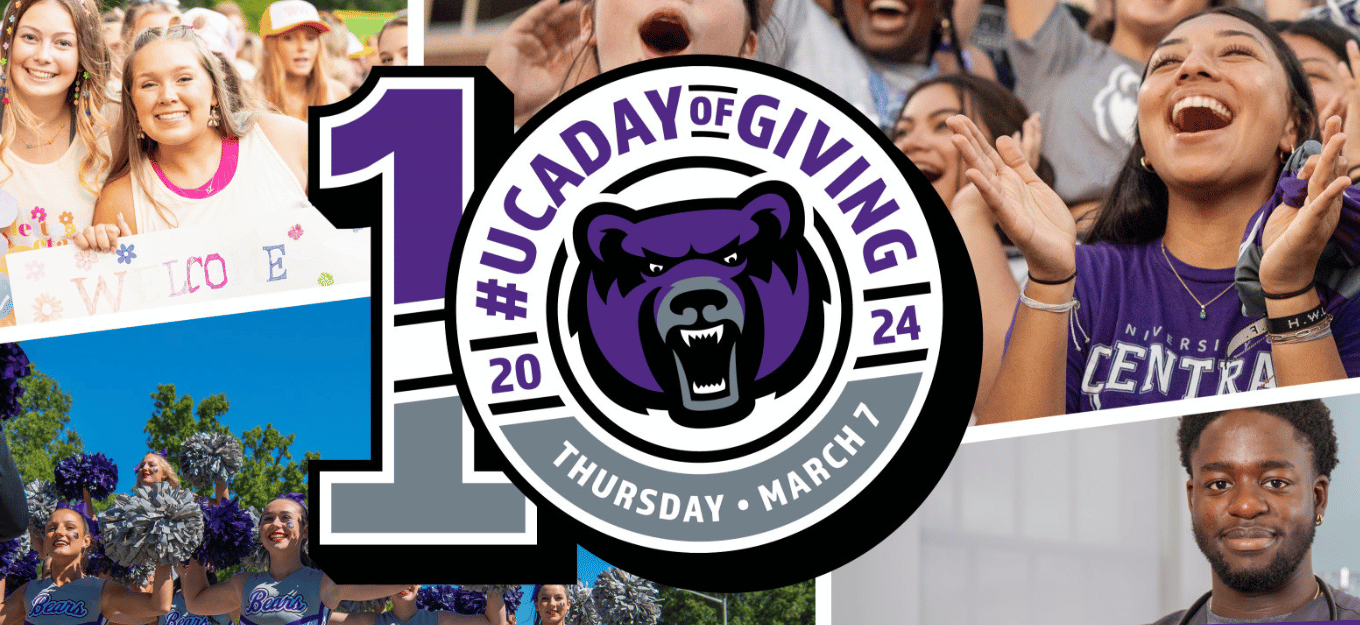The COB Bulletin shares news and highlights from the recent success of our students, alumni, faculty, and staff.
COLLEGE NEWS
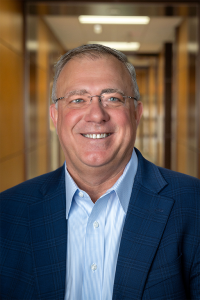 Our new Dean, Dr. Tim Bisping (pictured at right), was selected. He will begin on July 1, 2025, and has more than 30 years of experience in higher education, including as a professor and department Chair at our College of Business years ago; Dr. Bisping comes to us from the Nelson Rusche College of Business at Stephen F. Austin State University, where he has led initiatives to enhance academic excellence, foster faculty and staff development, and support student achievement. We are thrilled to welcome him as our Dean.
Our new Dean, Dr. Tim Bisping (pictured at right), was selected. He will begin on July 1, 2025, and has more than 30 years of experience in higher education, including as a professor and department Chair at our College of Business years ago; Dr. Bisping comes to us from the Nelson Rusche College of Business at Stephen F. Austin State University, where he has led initiatives to enhance academic excellence, foster faculty and staff development, and support student achievement. We are thrilled to welcome him as our Dean.- The UCA College of Business owes a debt of gratitude to Dr. Mike Casey, Professor of Finance, for his service as our Interim Dean during the past year. Serving as Interim Dean for the second time, he took on duties as Dean and continued teaching a full load of finance courses and authoring articles for Pearson. Dr. Casey is ready to return to EFIRM department faculty as Dr. Bisping joins us.
 UCA’s Beta Alpha Psi competition team (Rebecca Gaither, Carson Griffin, Jane Nim, Helen Sokha) presented at the Beta Alpha Psi Dallas Mid-Year Conference. Their project won the Deloitte Best Practices competition in the Impacting Your Profession category, and they will compete again at the annual meeting in August in San Antonio. The group is supported by faculty sponsors Dr. Connie McKnight and Dr. Ashley Phillips.
UCA’s Beta Alpha Psi competition team (Rebecca Gaither, Carson Griffin, Jane Nim, Helen Sokha) presented at the Beta Alpha Psi Dallas Mid-Year Conference. Their project won the Deloitte Best Practices competition in the Impacting Your Profession category, and they will compete again at the annual meeting in August in San Antonio. The group is supported by faculty sponsors Dr. Connie McKnight and Dr. Ashley Phillips.- Our College of Business was ranked #17 in Affordable Degree Guide’s 2024 Online Bachelor’s in Business Administration rankings.
- Dr. Louisa Moseley was recognized for her use of immersive simulations in Introduction to Business, and she was named UCA Learning Communities Faculty Associate of the Year for her work at BUILD@Carmichael.
 Arkansas Blue Cross and Blue Shield experts “took over” our College of Business to share their experience with students. They spoke about the jobs they do, the many opportunities available to students, and the skills those opportunities require. The BCBS representatives also spent their lunch networking with COB faculty and students. (Pictured from BCBS – from L to R: Ben McVay, Emily Shadell, David Martin, Trey Hankins, and Logynn Gambles; not pictured: Jason Carter)
Arkansas Blue Cross and Blue Shield experts “took over” our College of Business to share their experience with students. They spoke about the jobs they do, the many opportunities available to students, and the skills those opportunities require. The BCBS representatives also spent their lunch networking with COB faculty and students. (Pictured from BCBS – from L to R: Ben McVay, Emily Shadell, David Martin, Trey Hankins, and Logynn Gambles; not pictured: Jason Carter)- At its annual Outstanding Student Awards Banquet, the UCA College of Business announced and celebrated the Outstanding Students selected for the 2024-2025 academic year.
ACCOUNTING DEPARTMENT
 Accounting majors participated in the Volunteer Income Tax (VITA) program at United Way of Central Arkansas under the leadership of Dr. Ashley Phillips. They prepared 414 returns, saving the community over $75,000 in tax preparation fees and returning over $440,000 to community members through federal and state tax refunds.
Accounting majors participated in the Volunteer Income Tax (VITA) program at United Way of Central Arkansas under the leadership of Dr. Ashley Phillips. They prepared 414 returns, saving the community over $75,000 in tax preparation fees and returning over $440,000 to community members through federal and state tax refunds.- Dr. Bob Fang‘s paper, “Financial distress and stock return: A finite mixture approach” was accepted for publication at the Journal of Corporate Finance.
- Dr. Bob Fang won the Best Paper Award, 2024 for a paper he co-authored in the Journal of International Accounting Research and won Oustanding Paper in the 2024 Emerald Literati Awards for a paper he co-authored in the China Accounting and Finance Review.
- Dr. Anthony McMullen, Associate Professor of Business Law, guided student Rebecca Myers in an independent study on vehicular title washing. This spring, Rebecca presented her research to an official from U.S. Representative French Hill’s office.
- Professor Anthony McMullen was also awarded a Golden Gavel Award by the Arkansas Bar Association in recognition of his longstanding service and continued dedication to the Mock Trial Committee.
- Dr. Ashley Phillips and Dr. Karen Oxner have a paper entitled “Climate-Related Disclosures: Final SEC Rules” forthcoming in the Spring issue of Oil, Gas, and Energy Quarterly.
- Three Master of Accountancy students – Sidney Mack, Carson Griffin, and Bradley Bulice – presented research papers in March at the American Accounting Researchers and Educators annual Conference in Tulsa, Oklahoma. Sidney Mack presented two papers and won the Best Student Paper Award. These students were mentored by Dr. Karen Oxner, Dr. Ashley Phillips, and Luke Ferguson, J.D.
COMPUTER INFORMATION SYSTEMS & ANALYTICS (CISA) DEPARTMENT
 Jason Brown (student), Dr. K. Michael Casey, and Dr. Mark McMurtrey worked together on “Fintechs and Banking: A Note on Neobank Risks” for publication in the Journal of Accounting and Finance.
Jason Brown (student), Dr. K. Michael Casey, and Dr. Mark McMurtrey worked together on “Fintechs and Banking: A Note on Neobank Risks” for publication in the Journal of Accounting and Finance.- Abby Bounds, Senior Information Systems major and Girls Who Code President, along with Susan Shaw, College of Business CISA faculty and club co-sponsor, were invited to attend the WECode (Women Engineers Code) Conference at Harvard University.
- CISA celebrated with its graduates this semester. Here are pictured the most recent graduates receiving their Master of Science in Applied Data Analytics degrees (pictured: Dr. Ellis, Dr. Nichols, students Jack Griffin (fully online), Kathryn Webb, Parvinder Singh, Brittany Miller, and Dr. McKinzie).
- Dr. Joe Thomas was nominated as a Most Valuable Professor (MVP) for his work with student athletes.
ECONOMICS, FINANCE, AND INSURANCE & RISK MANAGEMENT (EFIRM) DEPARTMENT
- The EFIRM Department added to the curriculum with a new minor, The Economics and Insurance of Healthcare Administration, and a Transportation Economics class, two Student Managed Investment Fund classes, and a Financial Modeling class.
- Department Chair, Dr. Joe McGarrity, published 11 articles sharing his expertise in the Log Cabin Democrat.
- Pat and Marshall Moon from Meridian Investment Advisors visited the Student Managed Investment Fund (SMIF) course taught by Dr. Mike Casey. Pat runs a wealth management company that manages $800 million in assets.

- Economics major Perla Zapata and Dr. Tom Snyder presented their research paper about Economic Development Incentives at the Arkansas College Teachers of Economics and Business (ACTEB) Conference. Economics Student Veronica Bertolusso and Dr. Mavuto Kalulu also presented their paper about Campaign Financing and Economic Freedom at the ACTEB Conference.
 UCA’s Center for Insurance Director, Ivan Hudson, accompanied three UCA insurance majors to the Gamma Iota Sigma 2025 Regional Conference Series in Ft. Worth, Texas.
UCA’s Center for Insurance Director, Ivan Hudson, accompanied three UCA insurance majors to the Gamma Iota Sigma 2025 Regional Conference Series in Ft. Worth, Texas.- Alumni Update: Sam Brown (BA Economics, 2025) will attend law school in the fall, and John Crocker (BA Economics, 2013) is now overseeing 1,200 employees at the biggest pizza manufacturing plant in the world.
- Dr. Jeremy Horpedahl contributed his economics expertise to several blogs for economistwritingeveryday.com and contributed to news outlets like THV11, CNN, Arkansas Week, New York Times, and the Arkansas Democrat Gazette.
- For all of his extensive work, the Cato Institute named Dr. Horpedahl an Adjunct Scholar.
- Dr. Stephen Haibo Yao shared his expertise with WalletHub about car insurance and credit cards, while Dr. Jacob Bundrick contributed his educated opinions about Name, Image, and Likeness (NIL) issues. Professor Ivan Hudson also shared his expertise with WalletHub about liability insurance.
- Dr. Mike Casey also invited Drew Gainor to speak to his SMIF students. Drew was one of Arkansas Business’s top 40 under 40 and is a very successful wealth manager.
- The UCA Risk Manager on Campus program welcomed Mr. Carey Bond, Lloyd’s Head of US Claims, to share his extensive experience with our students, faculty and staff, and community insurance professionals. This event was made possible by a Spencer Educational Foundation grant.
- Mr. Clint O’Neal, Executive Director of the Arkansas Economic Development Commission, spoke to Dr. Tom Snyder’s Economics Senior Seminar class. Dr. Snyder also invited two economists from the Bureau of Labor Statistics to speak about careers and different types of data that students can use.
- Dr. Ling He retired after 26 years of service at UCA.
 Arkansas Center for Research in Economics Undergraduate Research Fellows–Veronica Bertolusso, David Tooley, and Perla Zapata–presented their faculty-mentored papers at the 2025 Society of Business, Industry and Economics (SOBIE) Conference in San Destin, Florida. Perla Zapata earned a student research award (for the second year in a row) and also won the Wesco Student Research award at the conference.
Arkansas Center for Research in Economics Undergraduate Research Fellows–Veronica Bertolusso, David Tooley, and Perla Zapata–presented their faculty-mentored papers at the 2025 Society of Business, Industry and Economics (SOBIE) Conference in San Destin, Florida. Perla Zapata earned a student research award (for the second year in a row) and also won the Wesco Student Research award at the conference.- Four students, Nathan Cannon, Anna Turgaeva, Jordan Scoggins, and Hunter Brown, wrote op-eds in Dr. Joe McGarrity‘s Modern Political Economy course that were published in newspapers around the state.
- After receiving encouragement from Dr. Rania Al-Bawwab, student Tyler Lister submitted an essay that earned first prize and was awarded a scholarship from the Money Metals Exchange and Sound Money Defense League.
- Dr. Collin Hodges and Dr. Jeremy Horpedahl led discussions for a 10-week reading group that explored economic freedom, while Dr. Jacob Held, UCA Professor of Philosophy, led the Watchmen reading group from January to April. The reading groups were sponsored by the Arkansas Center for Research in Economics.
- Dr. Collin Hodges‘ paper “Prescription opioid spillovers: Retail pharmacy level analysis” was accepted at the Journal of Substance Use and Addiction Treatment.
MARKETING AND MANAGEMENT DEPARTMENT
- Dr. Tracy Suter, Associate Professor of Marketing, was selected among the first group of 75Strong, a new statewide program designed to train economic developers and community leaders on entrepreneurship and small business development and to provide direct technical support for small businesses throughout Arkansas.
- Dr. Ron Duggins, Associate Professor of Innovation & Entrepreneurship, led two student teams to the semifinals of the 2025 Arkansas Governor’s Cup: Ally Loter and Zoe McMillion & Clover Quill and Jacob Sanders.
- Seven COB students competed in business-related events at the Future Business Leaders of America (FBLA) Collegiate State Conference and earned top awards in their events: Kaddie Bailey, Laney Bounds, Abby Bounds, Grayson Gardner, Mason Smith, Johnny Vasquez, and Melany Valesquez. Five of these students competed at the national conference in May. Dr. Marsha Carson sponsors the FBLA chapter at UCA.
- COB’s experiential education opportunities continued to win students great jobs. After JB Hunt’s visit to the Bears Advancing Supply Chain Management (BASCOM) club, supply chain student Julia Cockrell earned one of three positions in their Intermodal Manager Trainee program.
 Arkansas PBS partnered with Dr. Benjamin Garner‘s Content Marketing students to create 13 published blogs. Dr. Garner’s students also produced marketing videos for 9 community clients.
Arkansas PBS partnered with Dr. Benjamin Garner‘s Content Marketing students to create 13 published blogs. Dr. Garner’s students also produced marketing videos for 9 community clients.- Dr. Steven Schlachter had an article accepted at The International Journal of Organizational Diversity titled “Out of the Shadows: LGBT Employee Resource Group Leaders Embracing Their Identity.”
- Dr. JiHoon Jhang presented a paper titled “The Unintended Consequences of Stakeholder Resource Integration on Collective Consumer Engagement” at the 2025 AMA (American Marketing Association) Winter Academic Conference in Phoenix, AZ.
- Dr. JiHoon Jhang had a manuscript entitled, “More variety-seeking in sorted versus non-sorted option displays in hospitality: The moderating effect of optimal stimulation level” accepted for publication in the International Journal of Hospitality Management.
- Dr. JiHoon Jhang had a manuscript entitled, “AI-Generated News Content: The Impact of AI Writer Identity and Perceived AI Human-Likeness” accepted for publication in the International Journal of Human-Computer Interaction.
- Dr. JiHoon Jhang was nominated as Most Valuable Professor (MVP) by UCA Baseball and was honored at Bear Stadium.
- Dr. JiHoon Jhang had two manuscripts, “When Humans Face Limits: How Perceptions of God Affect Purchase Decision Avoidance” and “The Unintended Consequences of Stakeholder Resource Integration on Collective Consumer Engagement,” accepted for presentation and will present both papers at the 2025 AMA (American Marketing Association) Summer Academic Conference in Chicago, IL, this August.
- Dr. JiHoon Jhang‘s international research team, for which he serves as co-PI, has been selected as the recipient of the 2025 International Collaborative Research Promotion Grant by Ritsumeikan University, Kyoto, Japan.
- Students Robert Walker, Oluwandamilola “Dami” Osundolire, and Madison Wills conducted a survey under the mentorship of Dr. Alex Chen to understand students’ attitudes and behavior toward Artificial Intelligence (AI). They completed a preliminary report including a college comparison, class comparison, types of AI usage, AI software comparison, and purposes of AI usage.
MASTER OF BUSINESS ADMINISTRATION
- Master’s graduates Philipp Haessner and Julian Haessner joined Dr. Mark McMurtrey to publish “Trends & Challenges in the Food Supply Chain” in the Journal of Strategic Innovation and Sustainability.

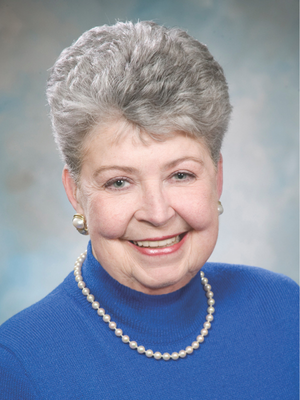
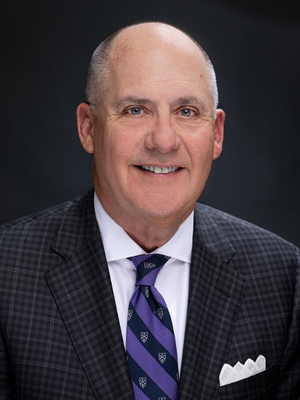
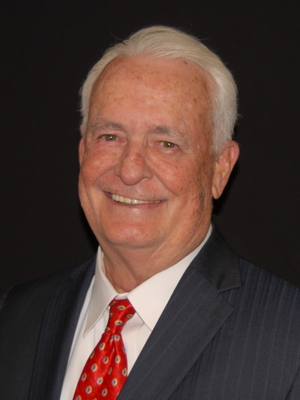
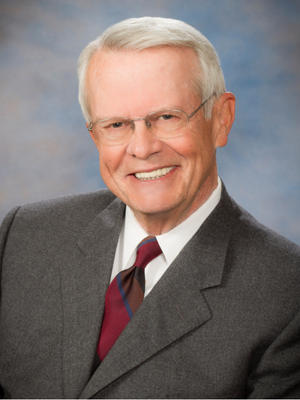
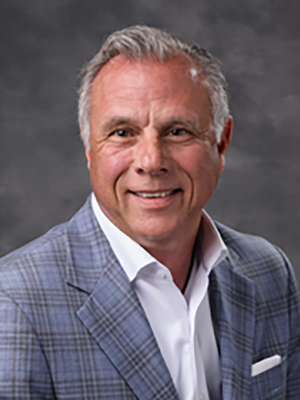



























 The University of Central Arkansas Insurance and Risk Management program has been awarded a grant from the
The University of Central Arkansas Insurance and Risk Management program has been awarded a grant from the 



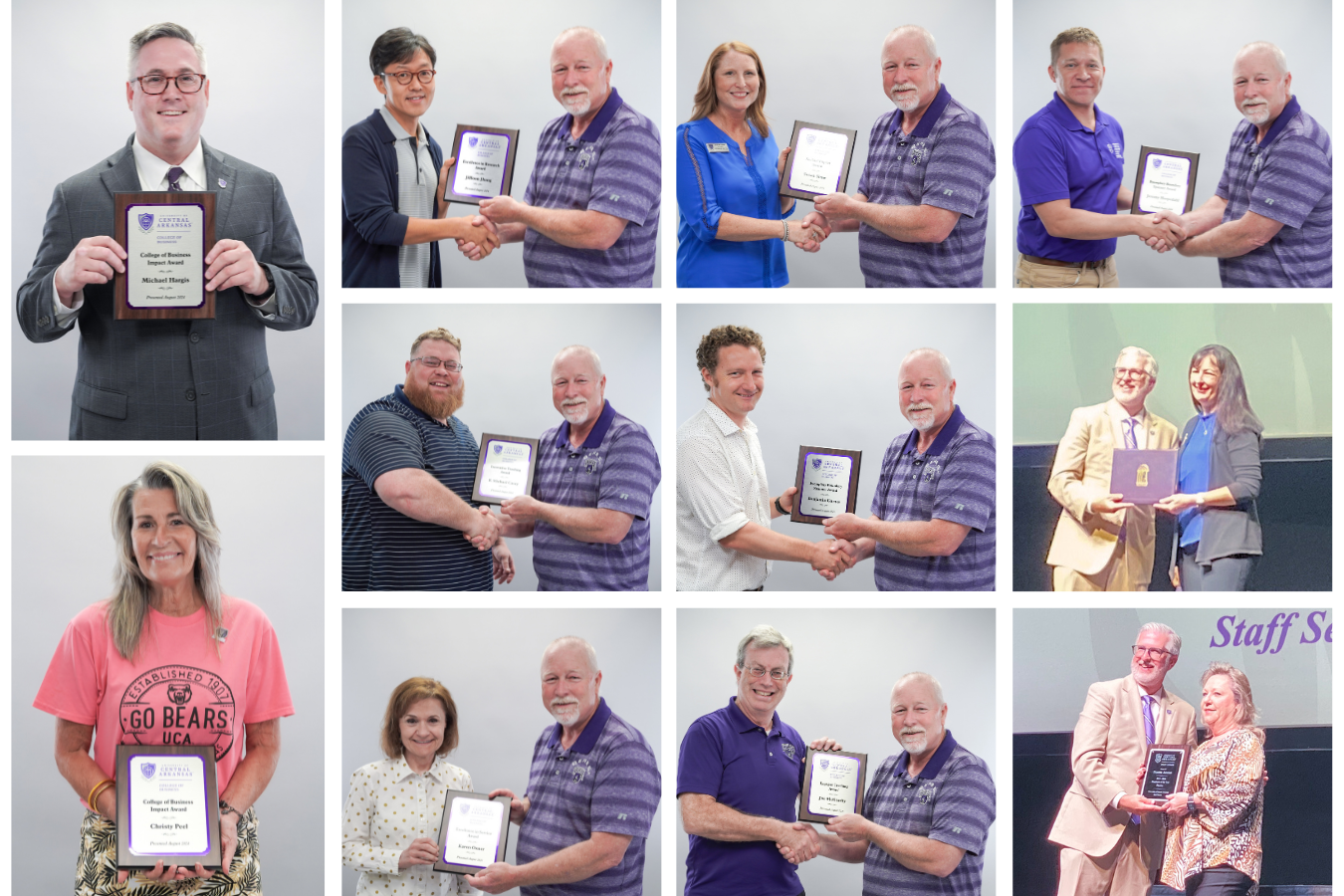

 Roeder visited campus for two days. At the luncheon on Monday, April 15, we were joined by many students, faculty, and insurance professionals, including Arkansas Insurance Commissioner Alan McClain, who spoke a few words to highlight the significance of the IRM industry in Arkansas.
Roeder visited campus for two days. At the luncheon on Monday, April 15, we were joined by many students, faculty, and insurance professionals, including Arkansas Insurance Commissioner Alan McClain, who spoke a few words to highlight the significance of the IRM industry in Arkansas.
